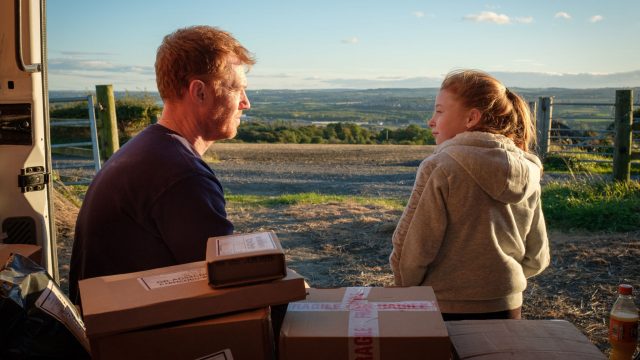Cannes 2019: Sorry We Missed You, by Luiz Oliveira

The Turner family, typically blue-collar and traditional (a husband, a wife, a teenage son and a ten year old daughter), are about to try for a more ambitious lot in life when Ricky (Kris Hitchen) realizes that, the way things are going, they’ll never be able to own a home, sentenced to pay rent for the rest of their lives. In the newest Ken Loach film, it is hardly a spoiler to say that their hopes and dreams are about to be miserably crushed by capitalism.
Ricky has been working odd-jobs since being laid off in the last recession and he is now set to become a delivery man, a van-owning franchisee of a logistics company who reports to Gavin Mulroney (Ross Brewster), a hard-talking, no-nonsense, bald and muscular brute of a man whose sole interest is to keep the machine well-oiled and running, while encouraging his employees to be the best. Well, they aren’t exactly employees but technically subcontractors and therefore out of reach of any social benefits rendered due to employment.
Ricky’s wife, Abbie (Debbie Honeywood), is a home-care nurse who spends her days on a fixed time-table, going from patient to patient, tending to the elderly and the handicapped. A deposit on Ricky’s van, however, will require her to sell her car, the family’s only real asset and the first sign of the strain that’s coming. The move to public transportation for Debbie will see her breaks diminished and render the family’s general ability to move around moot, a disaster for any parent of a teenager.
The two kids, Seb (Rhys Stone) and Lisa Jane (Katie Proctor), couldn’t be more opposite but that might just be because they’re at different stages of development. Seb is a rebellious teenager who skips school to spray graffiti with his friends and Lisa is a wunderkind, attentive and happy to take charge whenever she needs to. Slowly but surely, it is they who reveal themselves as the biggest victims of their parents’ struggle.
Loach is working on three fronts here. The first is the parents’ struggle to earn more money and reduce their debt, Ricky’s especially. He is continually pushed to pick up more routes, try to make more money, and hideously punished for missing practically impossible marks. The franchising scheme he has entered ends up looking more and more like a scam, extracting more and more money from him when it should be rewarding his efforts.
The second layer is the cyclical nature of this struggle. With more time at work, less is left with the kids and this parental absence forms the emotional struggle and heart of the film. Not only are the kids not cared for but they are exposed to a view of the world where it doesn’t really matter how hard or how long you work, you’ll never get anywhere. No wonder Seb is utterly unambitious.
The last motif is Loach’s portrayal of British society. Plenty of current headlines are present in the film: elderly folks’ abandonment and subsequent loneliness, the booming delivery business in an e-tail world, violence in working-class families, bullying in school, and even British soccer fandom.
It’s also interesting to note that, like in his previous film, the Palme-winning “I, Daniel Blake,” the working-class protagonists are surely the Donald Trump-voting, Brexit-cheering multitudes of people constantly criticized by the liberal mindset that is sure to heap love and praise on this great film. Loach’s fast paced, heart-wrenching film is short but sprawling.





























